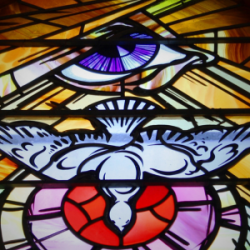
Death Doesn’t Bring Life
In her book Stand Your Ground: Black Bodies and the Justice of God, Kelly Brown Douglas writes of the force of the resurrection with specific emphasis on how evil is defeated in the gospels stories. Death doesn’t bring life. Life brings life.
Welcome Readers! Please subscribe to Social Jesus Here.
This is Part 3 of The Original Good News of Easter
(Read this series from the beginning at Part 1 and Part 2.)
“The resurrection is God’s definitive victory over the crucifying powers of evil. Ironically, the power that attempts to destroy Jesus on the cross is actually itself destroyed by the cross. The cross represents the power that denigrates human bodies, destroys life, and preys on the most vulnerable in society. As the cross is defeated, so too is that power. The impressive factor is how it is defeated. It is defeated by a life-giving rather than a life-negating force. God’s power, unlike human power, is not a “master race” kind of power. That is, it is not a power that diminishes the life of another so that others might live. God’s power respects the integrity of all human bodies and the sanctity of all life. This is a resurrecting power. Therefore, God’s power never expresses itself through the humiliation or denigration of another. It does not triumph over life. It conquers death by resurrecting life.
Devine Whepons
The force of God is a death-negating, life-affirming force. This is significant in two ways. The black feminist literary artist and social critic Audre Lorde once said, “The master’s tools will never dismantle the master’s house. They may allow us to temporarily beat him at his own game, but they will never enable us to bring about genuine change.” What the crucifixion–resurrection event reveals is that God does not use the master’s tools. God does not fight death with death. God does not utilize the violence exhibited in the cross to defeat deadly violence itself. As Lorde suggests, while this may bring a temporary solution, it does not bring an end to the culture of death itself. Rather, one stays entrapped in that very culture. The culture of death is thus granted power over life. As such, “only the most narrow parameters of change are possible and allowable.” If indeed the power of life that God stands for is greater than the power of death, then this must be manifest in the way God triumphs over death-dealing powers. The freedom of God that is life requires a liberation from the very weapons utilized by a culture of death. In other words, these weapons cannot become divine weapons. This liberation was foreshadowed by Jesus’ refusal to cooperate with the powers of death at the time of his crucifixion. The culmination of this liberation is Jesus’ resurrection. (Kelly Brown Douglas, Stand Your Ground: Black Bodies and the Justice of God, p. 182-183)
The earliest form of the good news, good news that we still need today, is not that death brings life. But that:
-
- Empire doesn’t have the last word.
-
- There is a larger universe than that created by oppressors.
-
- As powerful as death is, life is even more powerful.
-
- This present moment doesn’t last forever.
-
- Injustice doesn’t have to win.
-
- Justice will continue to strive even in the face of of the deepest obstruction.
-
- The universe can be bent toward justice.
-
- Hope is a discipline that is worth it.
I’ll close this week with Joanne Brown’s and Rebecca Parker’s deep insights about the difference between a gospel that focuses on someone’s dying, even Jesus’ dying, and a gospel that focuses on the power of resurrected life to triumph and undo everything accomplished through death and injustice:
“Suffering is never redemptive, and suffering cannot be redeemed. The cross is a sign of tragedy. God’s grief is revealed there and everywhere and every time life is thwarted by violence. God’s grief is as ultimate as God’s love. Every tragedy eternally remains and is eternally mourned. Eternally the murdered scream, Betrayal. Eternally God sings kaddish for the world. To be a Christian means keeping: faith with those who have heard and lived God’s call for justice, radical love, and liberation; who have challenged unjust systems both political and ecclesiastical; and who in that struggle have refused to be victims and have refused to cower under the threat of violence, suffering, and death. Fullness of life is attained in moments of decision for such faithfulness and integrity. When the threat of death is refused and the choice is made for justice, radical love, and liberation, the power of death is overthrown. Resurrection is radical courage. Resurrection means that death is overcome in those precise instances when human beings choose life, refusing the threat of death. Jesus climbed out of the grave in the Garden of Gethsemane when he refused to abandon his commitment to the truth even though his enemies threatened him with death. On Good Friday, the Resurrected One was Crucified.” (For God So Loved the World?)
Are you receiving all of RHM’s free resources each week?
Begin each day being inspired toward love, compassion, justice and action. Free.
Sign up at HERE.



















